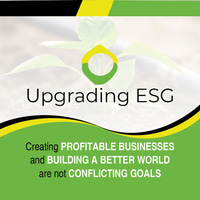Social
This involves not only treating your customers fairly but also your staff. By treating your staff fairly, you can increase productivity, by treating your customers better you can increase sales.
It is no secret that with all the growth in Innovation and Market Caps, most employees are underpaid and with no real change in the minimum wage. Income gaps and poverty continues to rise.
STAFF
Treating staff fairly , fair wage , incenticive to achieve greater pruducivity. fair labour practices and training
Areas of consideration
DIVERSITY
Increasing area of importance
CUSTOMERS
Treat your customers right
CSR
Establish a formal Corporate Social Responsibility Fund
SUPPLY CHAIN
You are responsible for how your suppliers treat their staff. Growing spotlight on child labour and modern slavery practice.
COMMUNITY
Support the communities where you operate
Featured Article
Social - needs more attention
There are huge pay gaps between the CEO, Management and employee, poor working conditions, modern slavery practices, gender diversity, and the shoddy way businesses treat their customers. Shockingly, we, the consumer, put up with this. Some companies see profit as the only measurement of success; The ESG train is a fast train that is bringing about change.
Featured Article
Social - Workers, People and Leadership
When looking at the Social aspect of ESG, one important point of reference is history. Western Civilization is based on the Bible, and the Book of Exodus has many lessons. It tackles head-on the issue of slavery and fair treatment of others. This article seeks inspiration from the timeless of the ancient, which are so applicable today. While researching for this article, I started to explore the prevalence of Poverty today. Poverty is about insufficient money to meet basic needs, including food, clothing and shelter. 84% live on less than $30 per day – a poverty line broadly reflective of the lines adopted in high-income countries. Let this sink in – 84% of people worldwide live in poverty. This indeed is depressing, and what are we doing about this?
Featured Article
Is there a connection between Ethics and ESG?
The question of the connection between ESG and Ethics has troubled me and there has been a lot of debate about Ethics and ESG.
To come to a conclusion - I decided to ask Chat GPT 2 questions:
Is there a connection between Ethics and ESG?
What is the origin of ESG?
From this base, I went into a relook at the original source of ESG – and that is the bible. In this week’s Torah (bible reading) of Mishpatim (translated as “Laws’), we have the concept of “double materiality” There is increasing use of the words “double materiality” in ESG/ Sustainability story of Companies.
Double materiality assesses the risks a company's activities pose to the environment and society.
It is remarkable that the Torah Laws given us to 3,400 years ago was so sensitive these issues. It was most definitely a revolution in so many ways, and these principles are so relevant still today. With all the so-called Innovation and advancement, we are at the core self-centered and governed by “whats in it for me?” and as a consequence we have oppression and abuse, unfair labour conditions, slavery and forced poverty around the world. Hence , the need for ESG today.
Indeed , quoting Dr Meir Tamari
“The urge for material goods is probably the most powerful desire that a man has; it’s the only one perhaps that is never satisfied, never gets weaker and always difficult to control.”
